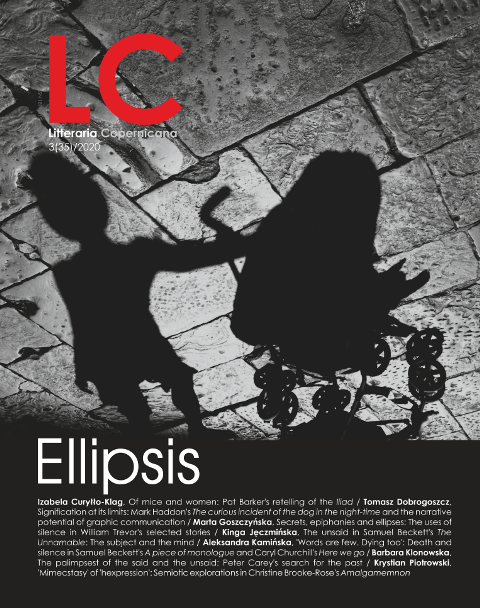Silence and fecundity in Carmen Maria Machado’s “Her body and other parties”
DOI:
https://doi.org/10.12775/LC.2020.037Schlagworte
ethics, alterity, corporeality, haunting, Carmen Maria MachadoAbstract
In the final chapter of Writing and Difference titled “Ellipsis”, Jacques Derrida describes lack as the element that is constitutive of meaning – what is missing from the book is “invisible and undeterminable”, yet it “redoubles and consecrates” it, so that “all meaning is altered by this lack” (1978: 296). Following Derrida’s cue that writing “is of an elliptical essence” (ibid: 296), I focus on lacks and silences in Carmen Maria Machado’s short-story collection Her Body and Other Parties (2017) and their contribution to meaning. Machado’s tales uncover new meanings in wellknown stories and depict experiences that are usually silenced, thereby highlighting the othering potential of story-telling and stressing the interdependencies between worlds and stories. In this essay, I refer to Emmanuel Levinas’s work on ethics, Maurice Blanchot’s writings on the relation between literature and ethics, and Jacques Derrida’s account of haunting to argue that the stories not only demonstrate that any text is made through what is missing, absent or different, but that they also establish an ethical relation with the reader based on shared vulnerability and uncertainty.
W ostatnim rozdziale Pisma i różnicy zatytułowanym „Elipsa” Jacques Derrida opisuje brak jako element, który konstytuuje znaczenie: niewidoczny i nieokreślony, brak jest tym, co zmienia cały sens książki, podwajając go i sankcjonując (1978: 296). Podążając za sugestią Derridy o eliptycznym charakterze pisma (ibid: 296) w artykule omawiam rolę milczenia i braku w zbiorze opowiadań Carmen Marii Machado Jej ciało i inne strony (2017). Opowiadania Machado odkrywają nowe znaczenia w dobrze znanych opowieściach i opisują doświadczenia, które zwykle są przemilczane lub wykluczane, aby uwidocznić płynność znaczenia i podkreślić wpływ opowieści na rzeczywistość. W artykule przywołuję filozofię etyki Emmanuela Levinasa, opis relacji między etyką a literaturą autorstwa Maurice’a Blanchota oraz Derridiańską logikę widma, by zaproponować odczytanie opowiadań Machado jako utworów, które zarówno podkreślają znaczenie tego, co nieobecne i inne w tworzeniu tekstu, jak też ustanawiają etyczną relację z czytającymi, której podstawą są wspólna niepewność i podatność na zranienie.
Literaturhinweise
Blanchot, Maurice 1999. The Station Hill Blanchot Reader: Fiction and Literary Essays. Translated by Lydia Davis, Paul Auster and Robert Lamberton. Edited by George Quasha. New York: Station Hill Barrytown.
Blanco, Marìa del Pilar [&] Esther Peeren 2013. “Introduction”. In: Marìa del Pilar Blanco [&] Esther Peeren (eds.). The Spectralities Reader: Ghosts and Haunting in Contemporary Cultural Theory. London: Bloomsbury.
Butler, Judith 2004. Precarious Life: The Powers of Mourning and Violence. London and New York: Verso.
Chanter, Tina 2001. “Introduction”. In: Tina Chanter (ed.). Feminist Interpretations of Emmanuel Levinas. University Park: Pennsylvania State University Press.
Corrigan, Jen 2018. “Speculative Feminism: On Carmen Maria Machado’s ‘Her Body and Other Parties’”. The Coil Magazine, 28 April 2018, on-line.
Derrida, Jacques 1978. Writing and Difference. Translated by Alan Bass. Chicago: University of Chicago Press.
Derrida, Jacques 1994. Spectres of Marx: The State of the Debt, the Work of Mourning, and the New International. Translated by Peggy Kamuf. New York: Routledge.
Garner, Dwight, Parul Szalai, Jennifer Sehgal 2018. “The New Vanguard”. The New York Times, 5 March 2018, on-line.
Gordon, Avery F. 2004. Ghostly Matters: Haunting and the Sociological Imagination. Minneapolis: University of Minnesota Press.
Haase, Ulrich, William Large 2001. Maurice Blanchot. New York and London: Routledge.
Irigaray, Luce 2001. “The Fecundity of the Caress: A Reading of Levinas, Totality and Infinity, “Phenomenology of Eros””. In: Tina Chanter (ed.). Feminist Interpretations of Emmanuel Levinas. University Park: Pennsylvania State University Press.
Jordan, Justine 2018. “Her Body & Other Parties by Carmen Maria Machado Review – Powerful Debut Collection”. The Guardian, 18 January 2018, on-line.
Levinas, Emmanuel 1985. Ethics and Infinity: Conversations with Philippe Nemo. Translated by Richard A. Cohen. Pittsburgh: Duquesne University Press.
Levinas, Emmanuel 1988a. Existence and Existent. Translated by Alphonso Lingis. Dordrecht, Boston, London: Kulwer Academic Publishers.
Levinas, Emmanuel 1988b. Collected Philosophical Papers. Translated by Alphonso Lingis. Pittsburgh: Duquesne University Press.
Lorek-Jezińska, Edyta, Katarzyna Więckowska 2017. “Applied Hauntologies: Spectral Crossings and Interdisciplinary Deconstructions”, Avant. Trends in Interdisciplinary Studies 8, 2: 15−23.
Machado, Carmen Maria 2017. Her Body and Other Parties. Stories. Minneapolis: Graywolf Press.
Scholes, Lucy 2017. “Her Body and Other Parties by Carmen Maria Machado, Book Review: Not Stories That Are Easily Dismissed”, The Independent, 20 December 2017, on-line.
Wolfe, Gary K. 2019. “Gary K. Wolfe Reviews Her Body and Other Parties by Carmen Maria Machado”, Locus, 19 March 2018, on-line.
Wolfreys, Julian 2013. “Preface: On Textual Haunting”. In: Marìa del Pilar Blanco, Esther Peeren (eds.). The Spectralities Reader: Ghosts and Haunting in Contemporary Cultural Theory. London: Bloomsbury.
Downloads
Veröffentlicht
Zitationsvorschlag
Ausgabe
Rubrik
Stats
Number of views and downloads: 2250
Number of citations: 0



